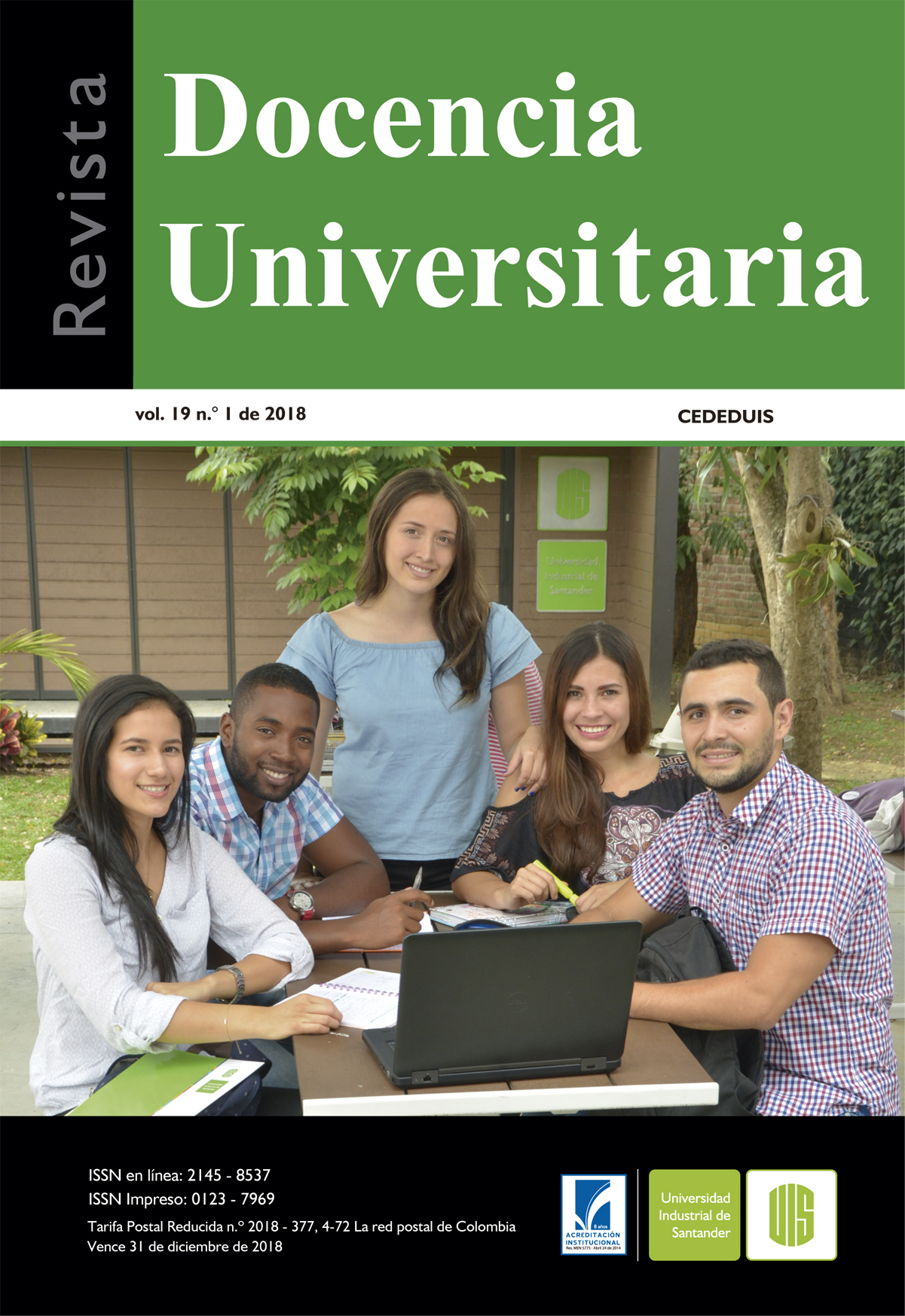Learning tools based on digital games as a strategy for teaching statistics to Industrial Engineering students
Published 2018-06-30
Keywords
- teaching technique,
- multimedia method,
- classwork,
- educational games,
- online games
How to Cite
Abstract
The present study consists in analyze the impact that the learning tools based on digital games have in the teaching of statistics, on undergraduate students of Industrial Engineering. Particularly, it is referred to the online tool developed by Norwegian researchers and academics known as Kahoot! The methodology used to the research was descriptive. The motivation of the work is twofold; in first place, it analyses the effect that the online-game platforms can have on the attitudes of participants towards the class sessions and, at the same time, to address the perception that the student has on its own acquisition of knowledge. In order to do this, a survey is applied to thirty-three (33) individuals enrolled in a Statistics course of Industrial Engineering. It is found that these techniques positively influence both the motivation and participation of students, and therefore, their understanding of the subject.
Downloads
References
Asa'd, R. y Gunn, C. (2018). Improving problem solving skills in introductory physics using Kahoot!. Physics Education, 53, pp. 1-4.
Batllori, J. (2004). Juegos para entrenar el cerebro: Desarrollo de habilidades cognitivas y sociales. Madrid: Ediciones Narcea.
Balakrishnana, V. y Lay, G. (2016). Students’ learning styles and their effects on the use of social media technology for learning. Telematics and Informatics, 33(3), pp. 808-821.
Bryant, S., Correll, J. y Clarke, B. (2018). Fun with pharmacology: Winning students over with Kahoot! game-based learning. Journal of Nursing Education, 57(5), pp. 320.
Díaz, M. (2009). La estrategia lúdica para la enseñanza de la química. Maestría en Enseñanza de la Química. Universidad del Zulia. Facultad de Humanidades y Educación. Maracaibo, Venezuela.
Fajardo, E., Romero, H., Plata, L. y Ramírez, M. (2018). Determinantes de la calidad de la educación en Colombia a nivel secundario: una aplicación del análisis de correspondencia canónica. Revista Espacios, 39(15), pp. 25.
Fajardo, E., Villalba, E. y Romero, H. (2015). Educational games for learning calculus in engineering science. Trabajo presentado en el Segundo Congreso Internacional de Ingeniería Mecánica y Ciencias Agrícolas. Bucaramanga, Colombia.
Gandulfo, M., Taulamet. M. y Lafont, E. (1994). El juego en el proceso de aprendizaje: capacitación y perfeccionamiento docente. Barbera del Valles: Humanitas.
Hernández-Sampieri, R., Fernández, C. y Baptista, P. (2007). Fundamentos de la metodología de la investigación. Madrid: McGraw-Hill Interamericana de España.
Jahnke, I.; Bergström, P.; Mårell-Olsson, E.; Häll, L.; y Kumarc, S. (2017). Digital Didactical Designs as research framework: iPad integration in Nordic schools. Computers & Education, 113, pp. 1-15.
Jara, F. y Cancino, P. (2018). La integración de los dispositivos móviles. Kahoot! Una estrategia didáctica para la evaluación de matemáticas en el nivel superior (ingenierías). Revista MICA, 1(1), pp. 34-46.
Jiménez-García, F., y Beleño-Montagut, L. (2017). Integración de las TIC en el curso de ondas y partículas de la Universidad Autónoma de Bucaramanga. Scientia et Technica, 22(1), pp. 95-101.
Kinder, F. y Kurz, J. (2018). Gaming strategies in nursing education. Teaching and Learning in Nursing, 13(4), pp. 212-214.
Licorish, S.; George, J.; Owen, H. y Daniel, B. (2017). “Go Kahoot!” Enriching Classroom Engagement, Motivation and Learning Experience with Games. Proceedings of the 25th International Conference on Computers in Education. New Zealand.
Marín, A., Montejo, J., Campaña, J. (2016). Una propuesta para el refuerzo de conceptos matemáticos a través de Kahoot!. Revista CIDUI. Recuperado de: www.cidui.org/revistacidui.
Meriño, V. (2018) Gestión del Conocimiento: Perspectiva multidisciplinar. Vol. 9. Santa Barbara: Fondo Editorial Universitario de la Universidad Nacional Experimental Sur del Lago “Jesús María Semprúm”.
Meneses, M. y Monge, M. (2001). El Juego en los niños: enfoque teórico. Revista Educación, 25(2), pp. 113-124.
Organización de las Naciones Unidas para la Educación, la Ciencia y la Cultura (2012). Activando el aprendizaje móvil en América Latina: Iniciativas ilustrativas e implicaciones políticas. Paris: Unesco.
Puentes, Y. (2014). Uso de la metodología lúdica para mejorar el rendimiento en los procesos de aprendizaje de las ciencias naturales. Bogotá: Instituto Latinoamericano de Altos Estudios.
Rodríguez-Fernández, L. (2017). Smartphones y aprendizaje: el uso de Kahoot en el aula universitaria. Mediterranean Journal of Communication, 8(1), pp. 181-190.
Rivas, D., Fajardo, E. y Villalba, D. (2011). Aplicación de juegos en clase, una mirada desde la ingeniería didáctica. Revista Ciencia e Ingeniería, edición especial, pp, 97-104.
Sánchez, J., Cañada, F. y Dávila, M. (2017). Just a game? Gamifying a general science class at university: Collaborative and competitive work implications. Thinking Skills and Creativity, 26, pp. 51-59.
Salinas, J. (2004). Innovación docente y uso de las TIC en la enseñanza universitaria. Revista de Universidad y Sociedad del Conocimiento, 1(1), pp. 1-16.
Torres, C. (2002). El juego como estrategia importante. Revista Venezolana de Educación, 6(19), pp. 289-296.
Wang, A. (2015). The wear out effect of a game-based student response system. Computers & Education, 82, pp. 217-227.

